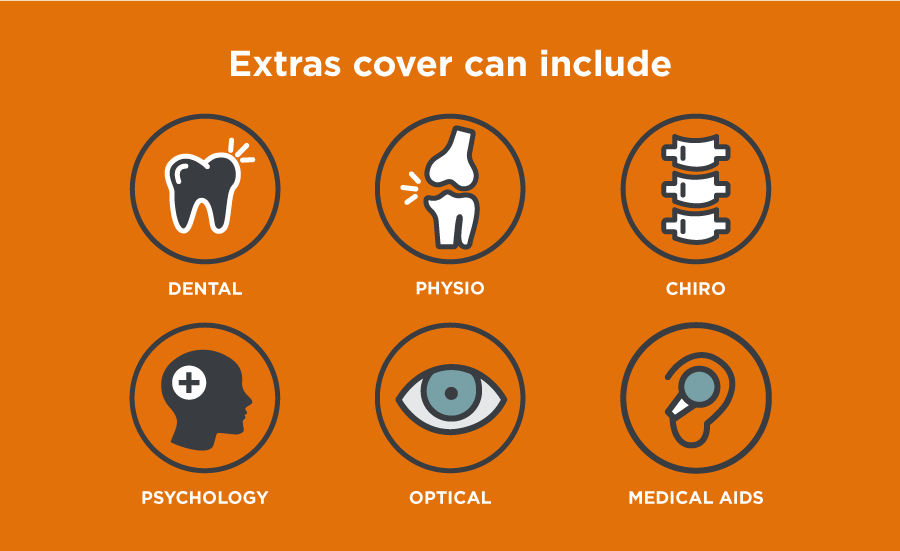Check out our range of private health funds
iSelect does not compare all providers or policies in the market and not all policies or special offers are available at all times, through all channels or in all areas. Not all policies available from our providers are compared by iSelect and due to commercial arrangements and customer circumstances, not all policies compared by iSelect are available to all customers. Learn more.
What is Extras Cover?
Extras Cover is a Health Insurance policy that covers some of the costs of some various general medical and healthcare services that happen outside of a hospital.1Commonwealth Ombudsman of Private Health Insurance – Choosing Health Insurance, General Treatment Cover These services are typically things you use quite a bit, like trips to the dentist, optometrist or the physio2Health Direct – Private Health Insurance Extras Cover is also sometimes called General Treatment or Ancillary Cover.
Learn more about what can be covered & how to compare Extras policies
Have you ever stopped and thought about how much it costs to pay for new glasses, dentist visits or massages? If you have (or you’re thinking about it right now), then you’d probably also like help towards the cost of these kinds of necessities and services. That’s where private Extras Cover could help.
How is Extras Cover different to other kinds of insurance?
Hospital Cover
Hospital Cover comes in handy for private hospital treatment, helping to pay for some of those scary bills, like accommodation, theatres fees, medicine and doctor’s fees, depending on your particular policy
Extras Cover
Extras Cover works a bit differently. It helps pay for a range of services not covered by Medicare such as dental and physio.
Family Combination Cover
family extras cover and family hospital policies cover very different things, so a lot of people actually get both. If you take out hospital cover and extras cover for your family you can usually combine them into a single policy You should also be able to combine different levels of cover to suit your needs, for example you might want gold hospital cover and a medium extras policy.
I already have Hospital Cover; can I still get Extras?
Most health insurance providers offer a combined extras and hospital cover. If you already have Hospital Cover, you can also consider buying Extras only cover separately from the same or a different provider.
How much does Extras Cover cost?
How much your Extras Cover premiums will be, will depend on a number of factors including your level of coverage. But you can use our interactive graph to see how you compare to other iSelect customers.
Our graph shows the average cost of Extras Cover for iSelect customers of different ages, from February 2022 – January 2023.
Frequently Asked Questions
What can I claim?
If you have Extras Cover, you can claim back part or sometimes even the full cost of the particular services covered by your policy.
Most policies allow you to claim either a percentage of the cost of an appointment or a certain amount for the same service each year up to the policy limits.1Commonwealth Ombudsman of Private Health Insurance – Ten Golden Rules of Private Health Insurance
The total amount you can claim depends on the level of cover you have and will vary between policies and funds.
How do the benefits and limits of Extras Cover work?
While Extras policies offer benefits in the form of rebates, they have different limits on how much you can claim each year for each specific service or treatment.
If you’re wondering how much money you’ll get back, this will depend on the service you’re claiming for, as well as the maximum limit your policy outlines.
Health insurers pay benefits in the form of either a percentage of costs, or up to a set dollar amount.
- Percentages: As an example, your provider may cover up to 70% of your dental costs, and then you’ll need to pay the remaining 30%. This is otherwise known as a gap payment.
- Dollar amounts: In this instance, your provider may have a limit to how much you can claim for a service. These limits are typically applied annually (per policy), or per visit.
Here are the different types of Extras limits:
- Annual limit: The maximum that you can claim for a service each year (either calendar or financial, depending on fund).
- Policy/family limit: Some services may have an annual limit per policy or service, so if you’ve got more than one person on your policy, then make sure your policy covers enough for all of you to make use of that service.
- Sub-limits: Some categories such as dental or physical therapy have limits on specific services like root canals, crowns, or massages. So, if you need to use a specific service within one of these categories that exceeds the sub-limit, then you will need to pay for the service.
- Combined group limits: Some insurers group services together and limit them to a total amount. For example, if your policy groups major dental, general dental and endodontic services together, then you’ll only have a set amount to use all of those services.
- Limits per item: Some policies have limits on specific items such as prescription glasses, or specific visits such as surgical tooth extractions.
- Limits per person: Some policies have limits on what each person can claim individually.
- Service limits: Some services are limited to a certain frequency, such as denture replacements that can be limited to once every two or three years.
- Lifetime limits: Some services are limited to a dollar amount over the lifetime of your policy. For example, if you’ve got a lifetime limits of $4,000 to claim on orthodontic services, any extra amount will need to be covered out-of-pocket. Remember that if you switch providers with the same lifetime limit in place, then you’d still have the same dollar amount leftover depending on how much you used with your previous provider.
What are the different levels of cover?
What services are included in Extras Cover?
Inclusions come down to your level of cover and your provider. They can range from practical services, like dental and optical cover, to slightly more fun activities like remedial massages.
You’ll find a list of what could be included below:
- General dental: Check-ups, examinations, x-rays, scale and cleans, and fillings.
- Major Dental: Root canal, crowns and bridges, implants and dentures, treatment for gum disease.
- Orthodontics: Braces, Invisaligns, retainers.
- Optical: Prescription glasses and contact lenses.
- Chiropractic: Consultations, x-rays, back manipulation, and spinal adjustments for musculoskeletal issues.
- Physiotherapy: Exercise or movement therapy for muscular recovery or post-operative needs.
- Osteopathy: Soft tissue massage, articulation (gentle joint movements), or spinal manipulation.
- Antenatal and Postnatal: Midwifery clinics, classes, maternal and child health services, vaccinations for newborns.
- Podiatry: Ingrown nails, bunions, corns, ankle and lower limb issues.
- Speech therapy: For children who are learning how to communicate, or for people who have speech disabilities or impairments, or for those who are re-learning how to communicate after a stroke.
- Occupational therapy: Treatment for people who have physical injuries or illness and need to re-learn how to walk or restore function of bodily movement after an accident or injury. Also for people who need help with recovering daily life skills.
- Audiology: Assessment and treatment for those needing help with hearing and balance. Includes devices such as hearing aids.
- Dietetics: Assessment and treatment for those needing help with diet, nutrition, weight loss, or disease management.
- Psychology: Assessment and treatment by a (clinical) psychologist for those who are struggling with their mental health.
- Acupuncture: Insertion of tiny needles at strategic points in the body to help with stress management and wellbeing.
- Chinese medicine: Herbal remedies, therapies, and natural treatments for physical and mental wellbeing.
- Remedial massage: Management and deep tissue treatment for injuries.
- Exercise physiology: Rehabilitation and clinically prescribed exercises for injuries, chronic conditions, disabilities.
- Health aids and devices: Asthma puffers, ventilators, blood glucose monitors, braces and splints, and CPAP machines.
- Orthotics: Shoe insoles to help restore natural foot function.
- Non-PBS medication: Prescription-only medicines prescribed by a GP that aren’t listed on the PBS.
- Home care: Support and nursing provided in the home.
- Vaccinations: Some policies may cover some of the costs of vaccinations, but these may be limited to travel vaccinations.
- Discounts: For gym memberships and local retailers.
How much money could I get back?
When it comes to Extras Cover, how much you get back depends on the cost of your service and level of cover your Extras policy provides. There are also a few different factors which impact how much you’re likely to get back which we’ve outlined below.
Dollar Benefits:
Some Extras policies cover a set amount for each service, up to an annual limit per year.2Australian Government Department of Health & Aged Care – Extras and ambulance cover For example, you might get around $40 back per genzeral dentist treatment, up to an annual limit of $350 per person per year.
Keep in mind that some policies group similar types of services together into a combined limit – such as physio, chiro and massage.
Percentage Benefits:
Rather than getting back a fixed amount for a service, some policies work with percentage benefits.3As above.
For example, if you go to the dentist and pay $90 for a service, your policy will cover a percentage of that total (for example 60%).
Regardless of whether your policy offers dollar or percentage benefits, make sure you check your policy for annual limits, as some providers might put a total annual cap on what you can claim.
Provider Schemes:
Some policies also offer preferred provider schemes, which means they’ve got agreements in place with specific service providers such as dentists and optometrists.
You’ll usually get better rebates if you visit one of these places and may not have a gap to pay.
Preventative health discounts
Some Extras policies may help cover the cost of preventative health services such as medically necessary gym memberships and exercise classes, programs to quit smoking, swimming lessons or even sunscreen.4AHM – Lifestyle extras (pages 5-6)
Discounts and freebies:
Other health funds offer loyalty or discount programs such as the AIA Vitality Points Program which offers policy holders discounts on flights, movies, spa treatments, shopping and more.5AIA – Your points and rewards, Guide to AIA Vitality
What are preferred providers?
Many health insurers work with certain providers for common Extras services such as dental, optical, or physio. This usually means that members have reduced costs to access services from these specific providers.
If you choose to use a provider that isn’t part of your Health insurer’s preferred provider network, then you may incur higher out-of-pocket costs.
What is a gap payment?
More often than not, a service will cost more than the benefit paid by your policy, so you’re left to pay the difference. This is called an out-of-pocket cost or gap payment and will vary depending on your policy. That’s why it’s important to compare different Extras Cover policies to see what’s included.
What are the waiting periods for Extras Cover?
If you’re new to Health Insurance or you’re upgrading your plan, you’ll need to go through a waiting period before you can make a claim.
These waiting periods vary, but generally, they’re from 2 to 6 months for things like general dental, optical and physiotherapy, and 12 months for more expensive services like orthodontics or hearing aids.
Waiting periods also apply if:
- you’ve re-joined after having a break in health cover
- you upgrade your cover to a higher policy.
Can providers waive waiting periods?
Occasionally, health funds may waive waiting periods for certain services, such as general dental or optical cover.6Commonwealth Ombudsman of Private Health Insurance – Choosing Health Insurance, General Treatment Cover Some funds also offer promotions for limited time periods, so it’s worth asking your provider before you sign up.
Is there a waiting period if I switch plans?
Why are there waiting periods?
Waiting periods can be frustrating. But they’re there for a reason.
In short, waiting periods can help to reduce premiums protecting existing members. If they weren’t in place, someone could sign up to Health Insurance, make a big claim, and then cancel their policy.
This could increase premiums and leave those paying consistently for their insurance to brunt the cost.
How do I make an Extras claim?
Once you’ve made it past the waiting period, you can start making claims.
If you visit a practice that has HICAPS (an electronic health claims and payment system), you’ll get money back instantly.
If not, you can make your claim manually with your provider via their claims process (usually via an app or website). Note to claim on some benefits – such as gym memberships – you may need to provide further evidence like a doctors evidence.
How long do I have to make a claim?
Most providers usually give you a bit of leeway as long as you were holding your cover at the time the service was used.
While it does vary between funds, most give you up to two years to make a claim from the date of service.
Should I get Extras Cover?
Well, that depends on you. If you’re someone who goes to the dentist and needs optical cover or you enjoy a regular massage, then it could be well worth your while.
It also depends on whether you’re buying it solely for yourself, you and your partner, or for the entire family.
- Families: If you and your kids frequently visit the dentist or the optometrist, or play a lot of sport and are prone to injuries, then Extras Cover could be a pretty good call to save on medical costs.
- Older People: Extras Health Insurance can be particularly valuable for older customers as it can help cover the types of treatments that become more likely as you age, such as optical treatment and lenses for reading glasses and trips to the physio for any sore or aching joints.
- Couples: Extras Health Insurance is a toss-up when it comes to couples. Plus, a couple’s policy isn’t necessarily cheaper than two single policies. In some cases, it could be better value for you to buy separate Extras policies that better cater to your individual needs.
Is Extras Cover good value?
Extras Cover is exceptional value if you find a suitable policy and you make the most of it. The trick is to understand what you pay in premiums against what you get back in benefits.
So, if you’re struggling to pay for your policy, remember you can change your level of cover and/or switch providers at any time.
Can I reduce the cost of my Extras Cover?
Some Health Insurers may offer discounts, rebates or rate protections for people who:
- Pay premiums in advance
- Pay by direct debit
- Belong to a contribution group (i.e. your workplace organises your health insurance for you)
Some funds may also pay higher benefits to loyal members, so make sure you ask your provider if they offer any discounts or loyalty benefits before you sign up.
If I have Extras Cover do I have to pay the MLS?
Extras Cover doesn’t exempt you from paying the Medicare Levy Surcharge (MLS).
The MLS is income-tested, so from 1 July 2023 if you earn less than $93,000 for singles, or less than $186,000 for families (plus $1,500 for each dependent child after the first), then you may be exempt.7Australian Taxation Office – Medicare Levy Surcharge Income, Thresholds and Rates
If your taxable income is above these thresholds, then you will need to have Private Health insurance with Hospital Cover to be exempt.8Australian Taxation Office – Paying the Medicare Levy Surcharge
How do I check if I’m making the most of my Extras Cover?
- Request an annual claims statement and a Private Health Information Statement (PHIS) from your provider or view your usage using the online member portal provided on the fund’s website.
- The claims statement will show you the total benefits you received in the last financial year, including the cost of the services and how much you got back from your insurer.
Compare the refund total against your premium. Are you paying more than you’re getting in return? If your statement has both your Hospital and Extras cover on it, make sure you subtract your Hospital Cover. - If your premium is a lot higher than your benefits, you may want to consider switching to a more suitable level of cover.
Look at your PHIS statement. This will tell you what you can claim and help you work out whether you could be getting more value out of your policy or if you need to consider changing your level of cover.
If you want some help with comparing policies, chat to someone from our team on 1800 784 772 or schedule a call.
Health Insurance & Tax
Tax Implications on Health Insurance
How to save on Health Insurance
About the Medicare Levy Surcharge
About the Life Time Health Cover Loading
Government Rebate & Means Testing

.svg)














